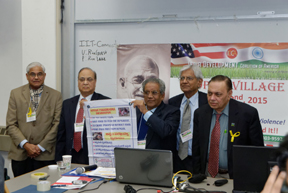
CHICAGO: India Development Coalition of America (IDCA) hosted its 13th annual conference at the IIT Rice campus in Wheaton, a northwest suburb of Chicago on October 17 and 18, on the theme “Exploring Innovative Strategies for Poverty Eradication and Climate Change Mitigation in India.”
Welcomed by founder-president Mohan Jain, who recounted IDCA’s achievements and ongoing initiatives, the four panels respectively covered water and livelihoods, education, healthcare and climate change.
Keynote speaker, Ramaswami Balasubramaniam, who founded at age 19 what has since become India’s top NGO – Swami Vivekananda Youth Movement (SVYM) – shared his decades-long experience working with and amidst tribal and marginalized communities in Karnataka. Development should focus on “capability development,” on human and social capital rather than infrastructure, with evidence rather than politics-based policies, i.e., supported by metrics. Credited for presenting the best annual reports and balance sheets, SVYM was deemed the best Indian NGO last year.
Sundaresan Subramanian, president of Chicago-based ConsultSubi, offered solutions for safe drinking water from sources contaminated by waste, leakages, agricultural runoffs, etc. Subijoy Dutta, Rivers of the World Foundation, Virginia, showed how low-cost biological treatment systems are being used to clean up the Yamuna, sister-river to the Ganga. Leah Barnes of DePaul University argued why Indian water initiatives that address rural migration matter to the wider world.
Distinguishing her “nano-” from better known micro-finance, Joyasree (Ranu) Mahanti described how her Amara Biswas Foundation has been securing the livelihood of village households in Orissa by facilitating entrepreneurship among women through small loans of $10 to $20 with payback period of one-full year, with positive self-sustaining effects for the extended family and across the entire community.
Prof. Jagdish Shukla, founder of Gandhi College in Ballia, U.P., recounted his successful elimination of rampant cheating from examinations, despite obstacles posed by bureaucratic corruption. Usha Bhaskar Shegde, founder of family-based Vishnu Narayan Foundation, presented its modest attempts to ensure that her native village in Maharashtra, India, enjoys facilities, such as library and computer center, that her children enjoy here.
The inspiration came from IDCA conferences she has been attending and Mohan Jain’s mentorship. Dr Manu Vora described his initiative since December 2013 to share quality management knowledge and soft skills to professionals and students at various educational institutions in India using free Google Hangout On Air.
Dr Vijay Yeldandi of Chicago-based Share Foundation illustrated a decade of public health programs in India through his comprehensive work with HIV. HIV rates are greater among rural women, who were receiving it from their husbands (Sita syndrome).
The findings revealed a larger number of bisexual Indians than expected in supposedly ‘conservative’ rural society. A network of 20 private medical schools across Andhra Pradesh provide sensitivization training and testing after informed consent. When recruited, infected young women served as “fanatical” peer counselors for (pregnant) women at risk. This Anti-Retroviral Treatment (ART) initiative is the biggest in India.
Dr. Subbarao Jayanthi of Illinois-based Jayanthi Foundation described collaborative efforts to alleviate type-1 diabetes. Dr V.K. Raju of Eye Foundation of America based in Morgantown, West Virginia, and Dr. Vora, who is also president of Blind Foundation for India, based in Naperville, Illinois, gave remote presentations, via Skype, of their work in India. So did Dr. Uma Koduri, who chairs the GAPIO (Global Association of Physicians of Indian Origin) committee for childhood obesity, on the “Nobesity Revolution” launched Dec. 12, 2012 from Tulsa, Oklahoma.
Dr. Velamoor Rajagopal of the Society for Hunger Elimination, Tirupati, India proposed a comprehensive campaign to alleviate childhood hunger and malnutrition in India,” which is home to a third of the global hungry and ranking poorly in the global hunger index (GHI). This recipient of the distinguished scientist award from late President Abdul Kalam also underlined the need to address the ‘hidden hunger’ of micronutrient deficiency.
The morning session the following day was devoted to climate change.
Sunthar Visuvalingam






